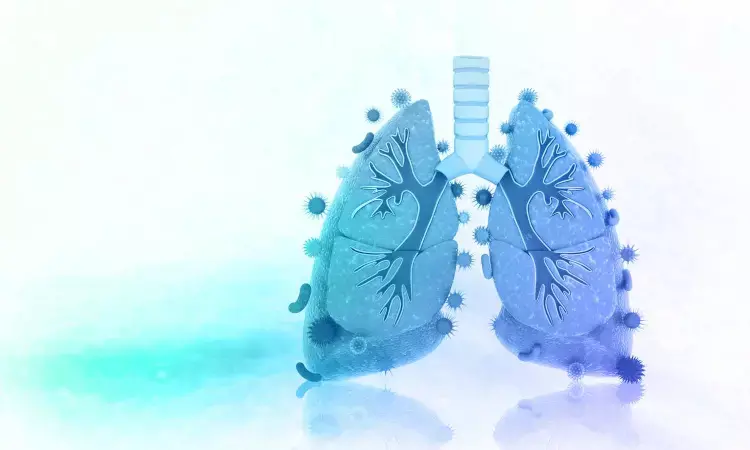- Home
- Medical news & Guidelines
- Anesthesiology
- Cardiology and CTVS
- Critical Care
- Dentistry
- Dermatology
- Diabetes and Endocrinology
- ENT
- Gastroenterology
- Medicine
- Nephrology
- Neurology
- Obstretics-Gynaecology
- Oncology
- Ophthalmology
- Orthopaedics
- Pediatrics-Neonatology
- Psychiatry
- Pulmonology
- Radiology
- Surgery
- Urology
- Laboratory Medicine
- Diet
- Nursing
- Paramedical
- Physiotherapy
- Health news
- Fact Check
- Bone Health Fact Check
- Brain Health Fact Check
- Cancer Related Fact Check
- Child Care Fact Check
- Dental and oral health fact check
- Diabetes and metabolic health fact check
- Diet and Nutrition Fact Check
- Eye and ENT Care Fact Check
- Fitness fact check
- Gut health fact check
- Heart health fact check
- Kidney health fact check
- Medical education fact check
- Men's health fact check
- Respiratory fact check
- Skin and hair care fact check
- Vaccine and Immunization fact check
- Women's health fact check
- AYUSH
- State News
- Andaman and Nicobar Islands
- Andhra Pradesh
- Arunachal Pradesh
- Assam
- Bihar
- Chandigarh
- Chattisgarh
- Dadra and Nagar Haveli
- Daman and Diu
- Delhi
- Goa
- Gujarat
- Haryana
- Himachal Pradesh
- Jammu & Kashmir
- Jharkhand
- Karnataka
- Kerala
- Ladakh
- Lakshadweep
- Madhya Pradesh
- Maharashtra
- Manipur
- Meghalaya
- Mizoram
- Nagaland
- Odisha
- Puducherry
- Punjab
- Rajasthan
- Sikkim
- Tamil Nadu
- Telangana
- Tripura
- Uttar Pradesh
- Uttrakhand
- West Bengal
- Medical Education
- Industry
A probiotic for our lungs? New research poses questions about the future of treating COVID-19

If we have learned one thing post-pandemic, it is that there is so much more to learn about the effects of COVID-19 on the population. This study published in Microbial Genomics has brought us a step closer to understanding more about how the virus affects our lung microbiome over time.
A microbiome is a community of microorganisms living together in a particular habitat. Studies have shown that there is a delicate balance of bacteria that play a vital role in living systems. For example, the human gut, soils, and oceans have unique microbiome communities. The lung was initially considered sterile, but scientists have recently discovered that, much like the gut, the lung is colonised by a variety of different bacteria that can have both positive and negative outcomes on lung health.
Previous studies into the lung microbiome have identified how other respiratory viral infections (such as influenza and RSV) disrupt the delicate ecosystem of lung bacteria, but little is known about how SARS-CoV-2 infections affect our URT microbiome over time.
The URT has a distinct microbiome consisting of all parts of the respiratory system above the trachea, including the nasal cavity. The URT microbiome is a dynamic community, which can vary from person to person depending on a number of factors, such as air quality, location or smoking and lung disease.
By comparing the URT microbiomes of a group of healthy individuals against a group with COVID-19 using ribosomal RNA gene sequencing, researchers were able to observe the effects of a COVID-19 infection on URT bacterial diversity. Unlike previous studies, the team designed a longitudinal study that observed changes over time, taking samples from the COVID-19 infected group over 21 days.
While the results of the study are promising, more research needs to take place to explore this relationship further. This research was undertaken during the height of the pandemic, so researchers were limited. The study was carried out on only a small group of otherwise healthy participants.
Researchers hope that this work can be carried out in the future on a larger group of more diverse participants. As it is an observational study, it is also unclear whether other factors may have affected the URT microbiome and the mechanisms by which this may have occurred.
“What this study suggests is that the viral infection changes your respiratory microbiome. Depending on how the microbiome is changed can potentially be predictive of the outcome.” Said Dr Suman Ranjan Das, lead author of the study. “The health of the URT microbiota is a modifiable risk factor, and if somehow we can modify that, then potentially we can reduce the impact of the virus on the body.”
Dr Das hopes that this study and further understanding of URT microbial disturbances induced by SARS-CoV-2 can help design interventions that can decrease the morbidity and mortality of this disease in the future.
“When you get infected, should we also take a supplemental bacteria cocktail?” He continues, “If we can modify both the lung and the gut microbiome in the right way, can we get a better outcome?”
Changes to the URT microbiome, such as those described in this study, could have implications for our long-term health. The microbiome plays a significant role in health and wellbeing. Studies have identified links between the lung microbiome, the immune system, and the brain.
In a world where over 670 million people have been infected by COVID worldwide, this potentially could have monumental long-term effects on global public health.
Reference:
Christian Rosas-Salazar, Kyle S. Kimura, Meghan H. Shilts, Britton A. Strickland, Michael H. Freeman, Bronson C. Wessinger, Veerain Gupta, Hunter M. Brown, Helen H. Boone, Seesandra V. Rajagopala, Justin H. Turner, Suman Ranjan Das Published: 23 February 2023 https://doi.org/10.1099/mgen.0.000957
Dr Kamal Kant Kohli-MBBS, DTCD- a chest specialist with more than 30 years of practice and a flair for writing clinical articles, Dr Kamal Kant Kohli joined Medical Dialogues as a Chief Editor of Medical News. Besides writing articles, as an editor, he proofreads and verifies all the medical content published on Medical Dialogues including those coming from journals, studies,medical conferences,guidelines etc. Email: drkohli@medicaldialogues.in. Contact no. 011-43720751


